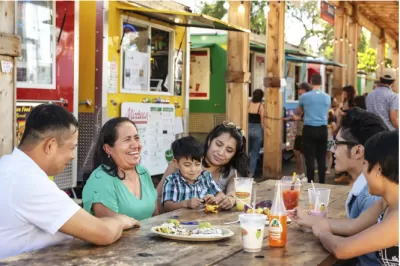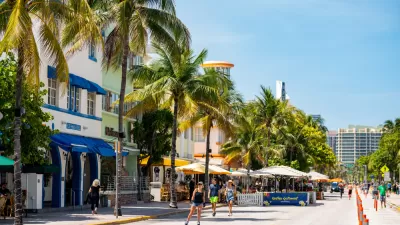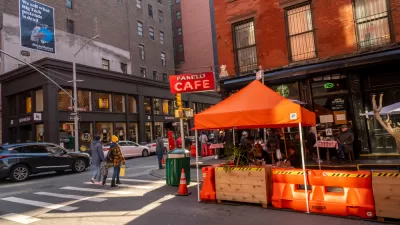PBOT will continue two highly successful COVID-era programs that allowed businesses and community groups to repurpose public spaces for pedestrian-oriented uses and engage with customers in safe, accessible outdoor settings.

A news release from the Portland Bureau of Transportation (PBOT) highlights Transportation Commissioner Jo Ann Hardesty's announcement that "two programs that helped businesses and community groups use street space for restaurants and public gatherings will be continued this summer, and could become permanent with City Council approval in the upcoming city budget." The decision comes after an outpouring of positive feedback from businesses and residents.
"The free Healthy Businesses permits that were set to expire June 30 will be extended at no charge through Aug. 31, to allow more time for the city and businesses to transition to the next phase of the program," with the future of the program contingent on funding from the 2022-2023 budget.
The Portland Public Street Plazas program is seeking applications for five to 10 plazas to be built this summer. "Continuation beyond this summer is also contingent on the budget City Council sets in the coming months." The Bureau has requested $8 million from the city to continue both programs.
During 2022, PBOT will work to reevaluate design standards and inspect existing facilities to ensure they are brought into compliance with city regulations. According to PBOT, "To stabilize neighborhood businesses, new design and operating regulations will go into effect gradually over time. These new rules ensure access for people with disabilities, emergency response, public transit operations, and loading zones."

Maui's Vacation Rental Debate Turns Ugly
Verbal attacks, misinformation campaigns and fistfights plague a high-stakes debate to convert thousands of vacation rentals into long-term housing.

Planetizen Federal Action Tracker
A weekly monitor of how Trump’s orders and actions are impacting planners and planning in America.

In Urban Planning, AI Prompting Could be the New Design Thinking
Creativity has long been key to great urban design. What if we see AI as our new creative partner?

King County Supportive Housing Program Offers Hope for Unhoused Residents
The county is taking a ‘Housing First’ approach that prioritizes getting people into housing, then offering wraparound supportive services.

Researchers Use AI to Get Clearer Picture of US Housing
Analysts are using artificial intelligence to supercharge their research by allowing them to comb through data faster. Though these AI tools can be error prone, they save time and housing researchers are optimistic about the future.

Making Shared Micromobility More Inclusive
Cities and shared mobility system operators can do more to include people with disabilities in planning and operations, per a new report.
Urban Design for Planners 1: Software Tools
This six-course series explores essential urban design concepts using open source software and equips planners with the tools they need to participate fully in the urban design process.
Planning for Universal Design
Learn the tools for implementing Universal Design in planning regulations.
planning NEXT
Appalachian Highlands Housing Partners
Mpact (founded as Rail~Volution)
City of Camden Redevelopment Agency
City of Astoria
City of Portland
City of Laramie





























